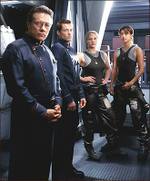Here are a few more true stories from my experiences in TV land ( I’ve mentioned these here before in the early days of this blog)…
Before starting a pitch, I like to ask the execs what they are looking for. At a recent meeting at a network, the exec said:
“We’re
wide open,” she said. “The only things we don’t want to hear are cop
shows, science fiction shows, anything set in the past, military shows,
buddy detectives or stuff with monsters.”
I could think of only one genre she left out. “What about a medical show?”
“Oh yes,” she said. “We don’t want those, either.”
* * * * * *
We were writing our first episode of a detective series. We turned
the script in to the network executive for his notes. The first note
was in scene one, act one.
“The hero doesn’t know what’s going on,” the executive said.
“That’s right,” I replied. “Because it’s a mystery.”
“You can’t do that,” the executive said. “The hero should be ahead of the story.”
“Ahead of the story?” I asked. “What does that mean?”
“The hero should know,” the executive said.
“Know what?” I replied.
“Everything,” The executive said.
“But
he just arrived at the scene,” I said. “He’s taking his first look at
the body… and you want him to already know everything?”
“Is he a
hero or a complete moron?” The executive asked. “Nobody wants to watch
a show about a guy who’s lost, confused, and stupid.”
“It’s a mystery and he’s a detective,” I said. “He’s going to show us how smart he is by solving the crime.”
“If he was smart,” the executive said, “he wouldn’t have to solve it. He’d already know.”
“So what’s the mystery?” I asked.
“There isn’t one,” the executive said.
“So what’s our show about if there’s no mystery to solve?”
“You tell me,” the executive said. “You’re the writer.”
* * * * * *
Bill Rabkin and I were in middle
of writing an episode of “Spenser: For Hire,” which was airing at 10
p.m. on Saturday nights. In our episode, Spenser sees a woman jump off
the roof of a building, so he begins to investigate why she wanted to
commit suicide. He discovers she’s fleeing her brother, with whom she
shared an incestous relationship. The network loved the story.
We
get a call on a Friday from the network. They had just decided to move
“Spenser For Hire” to 8 pm on Sunday, sandwhiched between “The
Wonderful World of Disney” and “The Dolly Parton Show.”
Somehow
our episode didn’t seem quite right for the Family Hour, unless your
idea of family is rather twisted. But the network didn’t think it was
quite as big a problem as we did.
“We love everything about the
script, so all you need to do is take out the incest,” the network exec
said, “but maintain the integrity of the story.”

